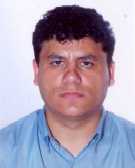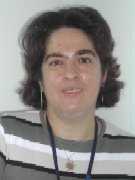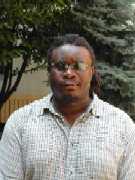Meet the Staff of the ERRC
29 June 2010
 Andi Dobrushi is a Staff Attorney. He has a degree in Law from the University of Tirana, Albania, and a LL.M. in Law from the Central European University, Budapest. He is a qualified lawyer in Albania.
Andi Dobrushi is a Staff Attorney. He has a degree in Law from the University of Tirana, Albania, and a LL.M. in Law from the Central European University, Budapest. He is a qualified lawyer in Albania.
My time at the ERRC as a lawyer has indelibly informed my thinking on lawyering for social change. Even if I wanted to, it would be extremely difficult to change the path I’ve embarked upon. I have come to realise what progressive lawyers have to learn in order to address the great justice challenge – and opportunity – of the new millennium: facing up to the full scope of race issues, and thereby moving our lawyering practices closer to our strongest theoretical visions of democracy.
* * *
 Anita Danka is Staff Attorney. She holds an MA in English from the University of Debrecen and an MA in Human Rights from the Central European University. She received her law degree from the University of Miskolc. She worked for the Canadian Embassy before joining ERRC.
Anita Danka is Staff Attorney. She holds an MA in English from the University of Debrecen and an MA in Human Rights from the Central European University. She received her law degree from the University of Miskolc. She worked for the Canadian Embassy before joining ERRC.
I decided to become a human rights lawyer due to a trip to India about ten years ago. My “incubator” shattered while I was walking among sick and poor people to see the magnificent beauties of the Taj Mahal in Northern India. I felt I was small, unimportant and not having any footprint in the world with a karma I did not know but I was desperate to influence. I was at that time doing my Masters in English. I got lucky and passed the entrance exam to law school, which I started parallel to my other studies. However, law school is not about human rights, so I was trying to soothe my hunger for this knowledge. Life gave me another present when I got accepted to the Human Rights Program of the Central European University. I had an intellectually very nourishing year at CEU, but my selfish interest kept pushing me towards actually using the knowledge I gained. After a year of small consultancy and research work, I started working at ERRC, which happened almost four years ago. Here I have the opportunity to do what I always wanted: using the power of law to contribute to positive changes in the world and having the privilege to actually see those small and big changes. As I stated before, I have selfish interests…
* * *
 Claude Cahn is ERRC Programmes Director. In that capacity, he supervises ERRC Research and Policy, ERRC International Advocacy and ERRC Human Rights Education. He has been involved in civil society work since the mid-1980s. He has been with the ERRC since shortly after it was founded in 1996. In 2005, he was Acting Executive Director of the organisation during sabbatical leave of Dimitrina Petrova. He is the author of numerous articles on various matters in a range of prestigious journals, including Cambridge Review of International Relations, Die Donauraum, European Anti-Discrimination Law Review, East European Human Rights Review, European Journal of Migration and Law, Human Rights Tribune, Humanitaire, Index on Censorship, and SAIS Review. He has also contributed to University of Sussex Reader on Nationalism and Racism in the Liberal Order, the Yearbook of the Organization for Security and Co-operation in Europe, a Friedrich Ebert Stiftung book on Roma rights issues, and a Netherlands Ministry of Justice Report on Efficiency of Justice in the Council of Europe and its Member States. He is editor of the book Roma Rights: Race, Justice and Strategies for Equality: Sourcebook on Contemporary Controversies (International Debate Education Association, 2002), as well as Executive Editor of the quarterly journal Roma Rights.
Claude Cahn is ERRC Programmes Director. In that capacity, he supervises ERRC Research and Policy, ERRC International Advocacy and ERRC Human Rights Education. He has been involved in civil society work since the mid-1980s. He has been with the ERRC since shortly after it was founded in 1996. In 2005, he was Acting Executive Director of the organisation during sabbatical leave of Dimitrina Petrova. He is the author of numerous articles on various matters in a range of prestigious journals, including Cambridge Review of International Relations, Die Donauraum, European Anti-Discrimination Law Review, East European Human Rights Review, European Journal of Migration and Law, Human Rights Tribune, Humanitaire, Index on Censorship, and SAIS Review. He has also contributed to University of Sussex Reader on Nationalism and Racism in the Liberal Order, the Yearbook of the Organization for Security and Co-operation in Europe, a Friedrich Ebert Stiftung book on Roma rights issues, and a Netherlands Ministry of Justice Report on Efficiency of Justice in the Council of Europe and its Member States. He is editor of the book Roma Rights: Race, Justice and Strategies for Equality: Sourcebook on Contemporary Controversies (International Debate Education Association, 2002), as well as Executive Editor of the quarterly journal Roma Rights.
“There is no path, there is no path at all,
Unless perhaps where abstract things have gone
And precepts rise and metaphysics fall,
And principles abandoned stumble on.
No path, but as it were a river in spate
Where drowning forms, downswept, gesticulate.”
Malcolm Lowry, Untitled, 1940
* * *
 Constantin Cojocariu is Staff Attorney. He received his degree in law from the University of Iasi, Romania. He also holds an MA in Political Sciences from the same university and an LL.M. in Human Rights from the Central European University in Budapest, Hungary. He is a qualified lawyer in Romania. Before joining the ERRC, he worked for a number of human rights organisations, especially in the field of discrimination.
Constantin Cojocariu is Staff Attorney. He received his degree in law from the University of Iasi, Romania. He also holds an MA in Political Sciences from the same university and an LL.M. in Human Rights from the Central European University in Budapest, Hungary. He is a qualified lawyer in Romania. Before joining the ERRC, he worked for a number of human rights organisations, especially in the field of discrimination.
After I started working for the Roma I discovered that many Romani activists would look down on me, just on account of my ethnicity. They would question my motives without previously knowing me or my competences. I believe that Roma rights can advance only when you have people from both the minority and the majority working together. Roma rights does not belong to Roma. There is a distinct and equally compelling interest that members of the majority can invoke – that of living in a society free of racism. This aim motivates me and legitimizes my work for Roma rights.
* * *
 Csilla M. Farkas is Operations Director. A communications professional who graduated from Eötvös Lóránd University Budapest, Faculty of Humanities, she holds degrees in English and American Studies and Romanian Literature. She has undertaken post-graduate work in film, sociology and communications, she worked extensively in areas of public relations, public affairs, as well as media.
Csilla M. Farkas is Operations Director. A communications professional who graduated from Eötvös Lóránd University Budapest, Faculty of Humanities, she holds degrees in English and American Studies and Romanian Literature. She has undertaken post-graduate work in film, sociology and communications, she worked extensively in areas of public relations, public affairs, as well as media.
Bob Dylan once responded to a question (I believe to the Jerusalem Post): why should I declare something that should be so obvious? Myself however, having worked at the ERRC for three years, am glad to answer.
I work for an organization that is a watchdog and does something concrete and measurable to fight racism, to help the Roma whose human dignity and rights are not just disregarded but harmed. Although operations is a back-office work, it provides support and environment for Programmatic and Legal work that I value and most naturally identify with. Why is it of value and importance for me to have such a workplace?
I am the third generation of very grave and unbearably light things. My father having moved us over borders always thought (and we hopefully will manage to let him think so for good) that he had taken care of the burden of having to redefine his family’s and his kids’ identity and face. I am grateful for him for all, even though Hungary made sure to prove him wrong. Absurdly, I am “grateful” to Hungary for making sure that I remain a minority and redefine with my own tools myself as a minority – as early as during my secondary school years. I can not recall one single miniscule fragment of memory when I did exist otherwise than “a minority”.
All this is far from elevated, but it defines the line of life and choices in the most natural and harmonious ways I can not describe, but rather just live it. I am lucky.
* * *
 Dimitrina Petrova is the Executive Director of the ERRC. She is a philosopher and human rights advocate. She was chair of the Human Rights Project (Sofia), a Bulgarian group defending the rights of Roma, a Member of Parliament, and a professor of Philosophy of Law and other courses in Bulgaria and other countries. She received the American Bar Association’s Human Rights Award in 1994.
Dimitrina Petrova is the Executive Director of the ERRC. She is a philosopher and human rights advocate. She was chair of the Human Rights Project (Sofia), a Bulgarian group defending the rights of Roma, a Member of Parliament, and a professor of Philosophy of Law and other courses in Bulgaria and other countries. She received the American Bar Association’s Human Rights Award in 1994.
Among my favourite lines of poetry are the lunatic words: “All people are born equal in dignity and rights”. Some of my friends say that human rights is part of their religion, or even a substitute for a divine truth. I am agnostic. For me, a mirage that is worth chasing is all that I can hope for.
* * *
 Dora Eke is Programmes Assistant. She has a degree in Computer Programming (Information Systems option) from the Southern Alberta Institute of Technology in Canada. She managed the Freedom Forum Library at the Center for Independent Journalism for seven years.
Dora Eke is Programmes Assistant. She has a degree in Computer Programming (Information Systems option) from the Southern Alberta Institute of Technology in Canada. She managed the Freedom Forum Library at the Center for Independent Journalism for seven years.
Before I joined the ERRC, I worked with an NGO that trained Romani people for journalism. Since I really liked the atmosphere there, I was looking for a similar new workplace. I like working with different people of various backgrounds and I enjoy my job in ERRC, as it always offers new challenges.
* * *
 Dzavit Berisa is Research and Publications Officer. He has a secondary school degree as a miner. Due to the war in Kosovo, he didn’t have the opportunity to further his education. Since 1999 he has been a human rights activist, working to defend the rights of Roma, Ashkali and Egyptian refugees in Macedonia.
Dzavit Berisa is Research and Publications Officer. He has a secondary school degree as a miner. Due to the war in Kosovo, he didn’t have the opportunity to further his education. Since 1999 he has been a human rights activist, working to defend the rights of Roma, Ashkali and Egyptian refugees in Macedonia.
In 1999 when I became refugee in Macedonia, I was told that I should visit the website of ERRC. When I visited the website of ERRC, I didn’t know what to read first because there was a lot of information and I thought that this NGO can help refugees. Today when I think about that time in 1999 I just cannot believe that I work in the same office to defend the rights of Roma, Ashkali and Egyptians. At ERRC I have learned a lot about how to protect my human rights because I belong to a group that is discriminated against in every day life.
* * *
 Hajnalka Németh is Receptionist and Office Secretary. She graduated from Cluj Unirea School, in Romania. Before joining the ERRC, she worked for a construction company, as a secretary to the Executive Director, in Romania, and then for 14 years as an English-language operator in the Hungarian News Agency Corporation.
Hajnalka Németh is Receptionist and Office Secretary. She graduated from Cluj Unirea School, in Romania. Before joining the ERRC, she worked for a construction company, as a secretary to the Executive Director, in Romania, and then for 14 years as an English-language operator in the Hungarian News Agency Corporation.
I am an ethnic Hungarian, born in Romania. I experienced how it feels to be a minority excluded from society. I will never forget how it felt to be rejected from the Cluj Medical Faculty just because I was beyond the number of Hungarians who were allowed to study at the faculty that year. Because of the difficulties we faced in Romania, we fled to Hungary with my husband in 1990. I got a job at the Hungarian News Agency Corporation in 1990 and spent 14 years there. When I saw the advertisement for a receptionist at the ERRC, I was very happy for the opportunity to join an organisation that defends the fundamental human rights of those who are systematically excluded from their societies, just like I was. Today, I am glad that I was chosen to join the staff of the ERRC. I like the multi-cultural environment and working with people from various countries from all over the world.
* * *
 Judit Pónya is Paralegal. She has a degree in English and Hungarian from the Comenius University in Bratislava and holds an MA in Gender and Culture from the Central European University in Budapest. She also finished a two-year-course for Legal Assistants in Hungary.
Judit Pónya is Paralegal. She has a degree in English and Hungarian from the Comenius University in Bratislava and holds an MA in Gender and Culture from the Central European University in Budapest. She also finished a two-year-course for Legal Assistants in Hungary.
I have worked mostly as a teacher, and it has been so disappointing when my students and my colleagues used stereotypes, especially about minorities. I am sensitive about these issues but whenever I feel the support of people who think in a similar way, I can be stronger to fight against false generalizations, negative attitudes and lack of knowledge. I joined the ERRC in 2005 and I really believe that together with my colleagues the fight against discrimination would be won soon.
* * *
 Julianna Oros is Financial Officer, graduated from the Budapest University of Technology and Economics, and holds a post-graduate degree in statistics. She also completed a tax-advisory course.
Julianna Oros is Financial Officer, graduated from the Budapest University of Technology and Economics, and holds a post-graduate degree in statistics. She also completed a tax-advisory course.
Before joining the ERRC in June 2004, I worked as the Financial Director in a bakery with 500 employees. Working in one of the poorest and least developed districts of Budapest, I had many disadvantaged colleagues who showed me the less bright side of life. This is why I became interested to apply for an organization like the ERRC and to contribute to its work, which is to ensure the full implementation of the rights of Roma. As a person dealing with finances, I see the complexity of this task and I understand how difficult it is to ensure, for example, the right to housing in the current economic situation both in Hungary and in Europe.
* * *
 Larry Olomoofe is Human Rights Trainer. He studied Social Sciences at Oxford University (University Diploma) and Social and Political Sciences at Cambridge University, England (BA and MA). Upon completion of his studies in the UK, he embarked upon a PhD at the New School University, New York. Prior to joining the ERRC, he was the Project Coordinator of the Civic Education Project – CEP (Hungary).
Larry Olomoofe is Human Rights Trainer. He studied Social Sciences at Oxford University (University Diploma) and Social and Political Sciences at Cambridge University, England (BA and MA). Upon completion of his studies in the UK, he embarked upon a PhD at the New School University, New York. Prior to joining the ERRC, he was the Project Coordinator of the Civic Education Project – CEP (Hungary).
During my four years as human rights trainer at the ERRC, I have witnessed numerous initiatives aimed at addressing the plight of Romani communities across Europe. It is my hope that the Decade of Roma Inclusion will not suffer the fate of many of these previous initiatives that failed to meet their purpose/target. The Decade of Roma Inclusion should be precisely about that: Inclusion! All Roma rights activists and advocates should engage in actions that will foster the full implementation and achievement of the Decade goals and make the initiative a useful and successful one, and not simply an empty token gesture.
* * *
 Margit Rémai is Accountant. She received her diploma from the Colle12ge of Finance and Accounting in Budapest. She also has a post-graduate degree in auditing.
Margit Rémai is Accountant. She received her diploma from the Colle12ge of Finance and Accounting in Budapest. She also has a post-graduate degree in auditing.
Before joining the ERRC in 2004, I had no experience in the non-govermental sector and this is why I found it challenging to apply and work here. During the last two years, I didn’t only learn new things about accounting in the non-profit area. My eyes were opened to the violations of the rights of the Roma and I had to face the fact that inhuman practices like the forced sterilization of Romani women are still executed by doctors who have indeed sworn to save the lives of people. The years I spent here taught me to see the world from a different perspective and I am glad for that.
* * *
 Olga Demian is a Legal Advisor from Moldova. After she graduated in International Law from the University of Humanitarian Studies of Moldova in 2001, she worked in the Moldovan government, in the private sector and in non-governmental organizations.
Olga Demian is a Legal Advisor from Moldova. After she graduated in International Law from the University of Humanitarian Studies of Moldova in 2001, she worked in the Moldovan government, in the private sector and in non-governmental organizations.
I grew up recognizing that there are fundamental differences in the kinds of resources available to families. I saw that some children are institutionalized; why, if they have special needs, are they ostracized? And why do some have access to education, jobs and incomes – when others do not? I believe that only by building legal precedents in children’s rights issues can we hope to achieve crucial reforms in the field of education central to the creation of opportunities for children from disadvantaged communities. Education means choice. Communities without access to education have fewer choices, yet they are frequently blamed for not making the right choices. Through the ERRC, I am part of a process which not only gives people the necessary tools to access their right to education, but also helps people to see the value of education.
* * *
 Ostalinda Maya Ovalle is Women’s Rights Officer. She graduated from the University of Sussex (U.K.) in Social Anthropology and Development Studies. Prior to joining the ERRC, she was involved in grassroots work in various countries.
Ostalinda Maya Ovalle is Women’s Rights Officer. She graduated from the University of Sussex (U.K.) in Social Anthropology and Development Studies. Prior to joining the ERRC, she was involved in grassroots work in various countries.
Working for the ERRC has given me the opportunity to transform my feelings of injustice into concrete and positive actions to fight for the rights of Roma and Romani women’s equality.
* * *
 Patricia Dévényi is Librarian/Administrative Assistant. She is currently studying Biology at ELTE University in Budapest.
Patricia Dévényi is Librarian/Administrative Assistant. She is currently studying Biology at ELTE University in Budapest.
I joined the ERRC five years ago. Since this was my first workplace I didn’t know what to expect. I also did not know much about Roma rights. I came to help out in the Legal Department for two weeks to help organise a training. My supervisor at the time realised that I have a special skill for filing and building up databases. That is how I became the librarian of the ERRC. As time went by, I received new tasks; some of them were and still are a real challenge. Today, besides the library and other administrative responsibilities, I maintain the website of the ERRC. Looking back, this constant change in my job is what motivates me after all these years. There are always new people, new issues, and new challenges.
* * *
 Rita Izsák is Mandate and Communications Officer. She has a degree in Law from the Péter Pázmány Catholic University.
Rita Izsák is Mandate and Communications Officer. She has a degree in Law from the Péter Pázmány Catholic University.
When I joined ERRC in 2002, racial discrimination was in many cases not properly understood and challenged by the victims, who had neither access to information about legal redress nor courage to take action against the perpetrators. This has changed by today, and there are more and more positive judgements in the courts that provide just satisfaction to Romani victims of racial discrimination. However, we have to face the perplexity of the responsible parties when it comes to implementing the positive judgements. In Bulgaria, for instance, although the ERRC won a case against a segregated school, the desegregation has not been started yet because the school leaders do not know how to do it. I believe therefore that Roma rights advocates and activists have to develop very concrete laws and best practices to help the responsible bodies to start real integration processes, not only in the field of education but in other areas as well. Moreover, the promotion of positive obligations should be considered as well, given that disadvantages faced by Roma are so embedded in the structure of our societies that more effective remedies might be needed to address the nature of their exclusion. I hope that the ERRC initiatives in these fields will be joined by other organizations and that a real cooperation can be achieved in order to get closer to the realization of equal rights and opportunities.
* * *
 Savelina Danova Russinova is Research and Policy Coordinator. She has a Masters degree in English Philology from the Sofia University, Bulgaria, and is an M.A. candidate in Human Rights from the Central European University in Budapest. Previously, she was the Director of the Sofia-based Roma rights organisation Human Rights Project.
Savelina Danova Russinova is Research and Policy Coordinator. She has a Masters degree in English Philology from the Sofia University, Bulgaria, and is an M.A. candidate in Human Rights from the Central European University in Budapest. Previously, she was the Director of the Sofia-based Roma rights organisation Human Rights Project.
In the early 1990s, the defense of Roma rights appealed to me because I saw it as a means of strengthening the rule of law in an emerging democracy, which Bulgaria (where I started working) was at that time. We believed that unless the protection of the law worked even for the most vulnerable, no one could be safe. Later on, as I got to know better the world of politics, I realized how the fate of Roma may become a mere tool for the advancement of personal or partisan interests of actors for whom Roma rights were of least concern. I pursued this work because I believed that there should be independent voices to expose false promises and ask questions that others would like to avoid. I liked the privilege of having this freedom. Now, when I look back to 15 years ago, I can see the steps, little as they are, that have been made in the direction that I and my colleagues wanted to go. This work has given me the chance to learn a lot about Roma, their problems and the principles that should shape the solutions to these problems. With this knowledge, I hope I could help move ahead the process of Roma rights promotion. Finally, I continue to work for Roma rights because I enjoy being one of a community of people who can resist the inertia of popular prejudice, who can face the risk of being reviled or looked down upon for their views and who believe in the equal dignity of people.
* * *
 Tara Bedard is Projects Manager/Researcher. She holds a BA in International Development Studies from the University of Toronto and an MBA in International Management. She has also completed a post-graduate programme in International Project Management.
Tara Bedard is Projects Manager/Researcher. She holds a BA in International Development Studies from the University of Toronto and an MBA in International Management. She has also completed a post-graduate programme in International Project Management.
My five years at the ERRC have provided me infinite opportunities to grow both personally and professionally. From my start as a researcher to my current position as projects manager, I have been fortunate to meet many varied and interesting people, to develop new skills and strengthen old ones, and to engage in action everywhere from impoverished Romani communities to intergovernmental institutions. I am not entirely certain what the future for Roma rights holds, but I believe it should include greater co-operation with and learning from other marginalised groups fighting for social change.
* * *
 Vera Gergely is Executive Assistant. She graduated from the Corvinus University of Budapest, and after the completion of her thesis she will hold an M.A. in Social Policy/Economics.
Vera Gergely is Executive Assistant. She graduated from the Corvinus University of Budapest, and after the completion of her thesis she will hold an M.A. in Social Policy/Economics.
I am from a middle-class, white-collar family, and I felt always somehow indebted to all those who did not have the opportunities that I had. Moreover, I am Jewish, so I am pretty much concerned about the issues of minorities. Consequently I got involved in Romani issues, and that is how I found the ERRC.




